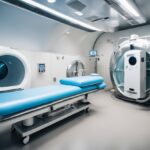Sleep is a critical aspect of human health, and its importance only increases with age. As people get older, they tend to experience changes in their sleep patterns, which can lead to a range of negative health outcomes. However, by optimizing their sleep habits, individuals can potentially slow down the aging process and improve their overall health and well-being.

The Science of Sleep and Aging
Sleep plays a vital role in maintaining physical and cognitive health, and it is particularly important for older adults. As people age, their bodies produce less melatonin, a hormone that helps regulate sleep. Additionally, older adults may experience changes in their circadian rhythms, which can disrupt their sleep-wake cycles. These changes can lead to sleep disturbances, such as difficulty falling asleep, waking up frequently during the night, and waking up too early in the morning.
Sleep Hygiene Basics
To optimize their sleep, individuals should practice good sleep hygiene. This includes establishing a regular sleep schedule, creating a relaxing sleep environment, avoiding caffeine and alcohol before bedtime, and limiting screen time in the hours leading up to sleep. Additionally, engaging in stress-reducing activities, such as meditation or deep breathing, can help promote better sleep. By following these basic sleep hygiene practices, individuals can improve their sleep quality and potentially slow down the aging process.
Key Takeaways
- Sleep is crucial for maintaining physical and cognitive health, especially as people age.
- Practicing good sleep hygiene, such as establishing a regular sleep schedule and creating a relaxing sleep environment, can help optimize sleep quality.
- By prioritizing sleep, individuals can potentially slow down the aging process and improve their overall health and well-being.
The Science of Sleep and Aging
Biological Impact of Sleep on Aging
Sleep plays a crucial role in maintaining overall health and well-being, and it is especially important for anti-aging. During sleep, the body undergoes a variety of processes that are essential for maintaining healthy cellular function and preventing age-related diseases.
One of the main ways that sleep impacts aging is through its effect on the body’s stress response system. Chronic sleep deprivation can lead to increased levels of stress hormones such as cortisol, which can damage cells and accelerate the aging process.
Additionally, sleep is important for regulating the body’s immune system. Lack of sleep can impair immune function, making individuals more susceptible to infections and other diseases that can contribute to aging.
Sleep and Cellular Repair
Another important way that sleep impacts aging is through its role in cellular repair. During sleep, the body produces growth hormone, which is essential for repairing damaged tissues and promoting cellular regeneration.
In addition, sleep is important for the brain’s glymphatic system, which helps to remove waste products and toxins from the brain. This process is crucial for maintaining healthy brain function and preventing age-related cognitive decline.
Overall, optimizing sleep is an essential component of any anti-aging strategy. By ensuring that individuals get enough high-quality sleep, they can support healthy cellular function, prevent age-related diseases, and promote overall health and well-being.
Sleep Hygiene Basics

Consistent Sleep Schedule
Maintaining a consistent sleep schedule is an essential part of good sleep hygiene. Going to bed and waking up at the same time every day helps regulate the body’s internal clock, making it easier to fall asleep and wake up feeling refreshed. It is recommended to aim for 7-9 hours of sleep each night, and to avoid sleeping in on weekends or days off.
Bedroom Environment
Creating a comfortable sleep environment can also help improve sleep quality. The bedroom should be cool, dark, and quiet. Using blackout curtains, earplugs, or a white noise machine can help block out any external noise or light that may disrupt sleep. Additionally, investing in a supportive mattress and pillows can help ensure a comfortable sleeping position.
Pre-Sleep Routine
Establishing a pre-sleep routine can signal to the body that it is time to wind down and prepare for sleep. This routine can include activities such as taking a warm bath, reading a book, or practicing relaxation techniques such as deep breathing or meditation. It is also important to avoid stimulating activities such as using electronic devices or engaging in intense exercise close to bedtime, as these can interfere with sleep.
By following these sleep hygiene basics, individuals can improve their sleep quality and promote anti-aging benefits.
Diet and Nutrition for Better Sleep
Foods to Promote Sleep
A balanced diet can improve the quality of sleep, and some foods are particularly helpful in promoting restful sleep. Foods rich in tryptophan, an amino acid that converts to serotonin and melatonin, can help induce sleep. Some examples of tryptophan-rich foods include turkey, chicken, fish, dairy products, nuts, and seeds.
Additionally, consuming foods with magnesium, such as leafy greens, nuts, and whole grains, can help relax the muscles, calm the mind, and promote sleep. Tart cherry juice is also a natural source of melatonin, which can help regulate the sleep-wake cycle.
It is important to note that consuming heavy or spicy foods, caffeine, and alcohol close to bedtime can disrupt sleep and should be avoided.
Supplements and Sleep Quality
Supplements can be a helpful addition to a balanced diet in promoting sleep quality. Melatonin supplements, which are available over-the-counter, can help regulate the sleep-wake cycle and improve sleep quality. However, it is important to consult with a healthcare provider before taking any new supplements, especially if taking other medications.
Magnesium supplements can also be helpful in promoting relaxation and sleep. Additionally, valerian root and chamomile supplements have been shown to have a calming effect on the mind and body, which can lead to improved sleep quality.
It is important to remember that supplements should not be used as a replacement for a healthy diet and lifestyle habits.
Exercise and Physical Activity

Impact of Exercise on Sleep
Physical activity has numerous benefits for overall health, including improving sleep quality. Regular exercise has been shown to reduce the time it takes to fall asleep and increase the amount of deep sleep obtained during the night. This is important for anti-aging, as deep sleep is when the body repairs and regenerates itself.
Exercise can also help regulate the body’s circadian rhythm, which is the internal clock that controls the sleep-wake cycle. This can lead to more consistent and restful sleep patterns.
Best Time to Exercise
While exercise is beneficial for sleep, the timing of exercise can also play a role in sleep quality. It is generally recommended to avoid exercising too close to bedtime, as the increase in heart rate and body temperature can make it harder to fall asleep.
The best time to exercise for optimal sleep is in the morning or early afternoon. This allows for enough time for the body to cool down and return to a resting state before bedtime.
In summary, regular exercise can improve sleep quality and help regulate the body’s circadian rhythm. To optimize sleep, it is best to exercise in the morning or early afternoon, and avoid exercising too close to bedtime.
Stress Management Techniques
Mindfulness and Meditation
Mindfulness meditation is a technique that involves focusing on the present moment and accepting it without judgment. It can be a useful tool for managing stress and anxiety, which are known to contribute to aging. Studies have shown that regular mindfulness meditation can reduce stress and improve sleep quality.
One way to practice mindfulness is to find a quiet place to sit or lie down and focus on your breath. You can count your breaths or simply observe them without trying to control them. When your mind wanders, gently bring it back to your breath. There are also many guided mindfulness meditations available online or through apps.
Relaxation Strategies
Relaxation techniques can help reduce stress and promote better sleep. Some effective relaxation strategies include:
- Progressive muscle relaxation: This involves tensing and then relaxing each muscle group in your body, starting with your toes and working your way up to your head.
- Deep breathing: Slow, deep breathing can help calm your mind and relax your body.
- Visualization: Imagining a peaceful scene or a relaxing experience can help reduce stress and promote relaxation.
- Yoga: Yoga combines physical postures with breathing and meditation, making it a great way to reduce stress and improve sleep.
By incorporating these stress management techniques into their daily routine, individuals can optimize their sleep and potentially slow down the aging process.
Monitoring Sleep Patterns
Sleep is an essential part of maintaining good health and preventing premature aging. Monitoring sleep patterns can help individuals identify any disturbances in their sleep and make necessary changes to optimize their sleep quality and duration.
Sleep Trackers
Sleep trackers are devices that monitor an individual’s sleep patterns and provide information on the duration and quality of their sleep. These devices can be worn on the wrist, placed under the mattress, or attached to the head. They use sensors to detect movements and provide data on sleep stages, including light, deep, and REM sleep.
Sleep trackers can provide valuable insights into an individual’s sleep patterns and help them identify any issues such as snoring, sleep apnea, or restless leg syndrome. They can also help individuals track their sleep debt and make necessary changes to improve their sleep quality, such as adjusting their sleep schedule or changing their sleep environment.
Sleep Diaries
Sleep diaries are another tool that individuals can use to monitor their sleep patterns. They involve recording information about their sleep habits, including bedtime, wake-up time, and any disturbances during the night.
Sleep diaries can help individuals identify any patterns or triggers that may be affecting their sleep quality, such as caffeine consumption or late-night screen time. They can also help individuals track their sleep debt and make necessary changes to improve their sleep quality, such as establishing a consistent sleep schedule or creating a relaxing bedtime routine.
Overall, monitoring sleep patterns can be a valuable tool in optimizing sleep quality and preventing premature aging. By using tools such as sleep trackers and sleep diaries, individuals can identify any disturbances in their sleep and make necessary changes to improve their sleep quality and duration.
Medical Interventions
Sleep Disorders and Treatment
Sleep disorders such as insomnia, sleep apnea, and restless leg syndrome can significantly impact the quality of sleep. These disorders can lead to daytime fatigue, mood changes, and other health problems. Medical interventions can help manage these sleep disorders and improve sleep quality.
Insomnia can be treated with medications such as benzodiazepines, non-benzodiazepine hypnotics, and melatonin receptor agonists. These medications can help improve sleep onset, duration, and quality. However, these medications should be used under the supervision of a medical professional as they can have side effects and may not be suitable for everyone.
Sleep apnea can be treated with continuous positive airway pressure (CPAP) therapy, which involves wearing a mask that delivers air pressure to keep the airway open during sleep. Other treatments for sleep apnea include oral appliances and surgery.
Restless leg syndrome can be treated with medications such as dopamine agonists, opioids, and anticonvulsants. These medications can help reduce the symptoms of restless leg syndrome and improve sleep quality.
Hormonal Considerations
Hormonal changes can also affect sleep quality. As people age, the production of growth hormone and melatonin decreases, which can lead to sleep disturbances. Hormone replacement therapy (HRT) can help improve sleep quality by replacing the hormones that are lost with age.
Testosterone replacement therapy (TRT) can also improve sleep quality in men with low testosterone levels. Low testosterone levels can lead to sleep disturbances, fatigue, and decreased quality of life.
It is important to note that HRT and TRT should only be used under the supervision of a medical professional as they can have side effects and may not be suitable for everyone.
Lifestyle Adjustments
Napping Strategies
Napping can be an effective way to improve sleep quality and overall health. However, it is important to nap strategically to avoid disrupting nighttime sleep. A short nap of 20-30 minutes can provide a quick energy boost without interfering with nighttime sleep. Longer naps should be avoided as they can lead to grogginess and difficulty falling asleep at night.
To optimize napping, it is recommended to nap at the same time every day and in a quiet, comfortable environment. It is also important to avoid caffeine and heavy meals before napping as they can interfere with falling asleep.
Light Exposure
Light exposure plays a crucial role in regulating the body’s sleep-wake cycle. Exposure to bright light in the morning can help reset the body’s circadian rhythm and improve sleep quality at night. On the other hand, exposure to bright light in the evening can suppress the production of melatonin, a hormone that promotes sleep.
To optimize light exposure, it is recommended to get at least 30 minutes of bright light exposure in the morning and to avoid bright light exposure in the evening. Using dimmer lights or wearing blue-light blocking glasses in the evening can also help promote better sleep.










